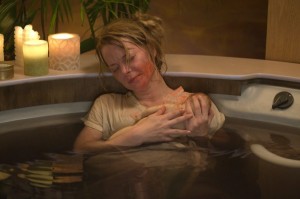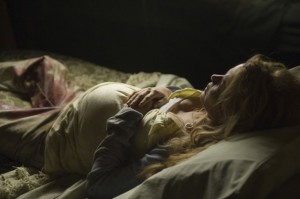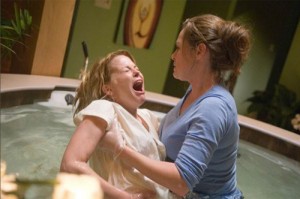Grace
 The current issue of Newsweek has a picture of a baby staring straight at the camera with a slightly concerned look on her face, with the headline across her forehead “Is your baby racist?” A deliberately provocative question (the article is nothing more than extended book promotion for the authors of the piece), but as a headline, it rates up there with the old New York Post offering, with a picture of an infant voraciously eating a watermelon, and innocently looking up at us. That headline read “When Melons Kill,” and it might have been suited as a title for an Attack of the Killer Tomatoes spin-off. The insinuations of both images are intended to cause fear, striking panic in every overprotective parent across the country.
The current issue of Newsweek has a picture of a baby staring straight at the camera with a slightly concerned look on her face, with the headline across her forehead “Is your baby racist?” A deliberately provocative question (the article is nothing more than extended book promotion for the authors of the piece), but as a headline, it rates up there with the old New York Post offering, with a picture of an infant voraciously eating a watermelon, and innocently looking up at us. That headline read “When Melons Kill,” and it might have been suited as a title for an Attack of the Killer Tomatoes spin-off. The insinuations of both images are intended to cause fear, striking panic in every overprotective parent across the country.
Paul Solet’s Grace might have been the right stuff for a headline, maybe, “Is your baby dead?” Grace, which is being released on DVD next week after a perfunctory theatrical release last month, is a very atmospheric horror film about a woman so desperate to conceive that she even ignores her own husband’s death in a car accident, as well as the more direct trauma, that the accident might have killed her baby too, and she’s simply going to deliver something stillborn. Solet establishes the mother’s mindset right away; Jordan Ladd’s Madeline is first seen enduring her husband’s sexual efforts, looking around as he thrusts away. The scene is highly reminiscent of Todd Haynes’ Safe, where Julianne Moore does the same thing with her husband, setting up a thorough disconnect with her environment. Solet makes a mistake though, because the information that should have been provided, perhaps over the opening credits instead of 20 minutes in, is that Madeline has already had two miscarriages. Without knowledge of her conception troubles, she just seems self-centered and condescending to her husband, instead of sad and potentially worthy of our sympathies.
 Not that Madeline’s actions after she gives birth are all that sensible. Whether it’s a bout of post-partum depression or a miracle is never made clear, but Madeline wills her baby back to life after a rather traumatic natural birth. Solet chooses not to answer the question about Madeline’s paranoia, and for a while, it works well. As her baby (given the titular name) begins to attract flies, smell rotten, and crave blood, the suggestion is that Madeline could be imagining her existence, or she could be a zombie/vampire, or maybe Grace is just flat-out dead. The birthing scene is horrifying, disturbing, and ambiguous enough to give us all three possibilities. And Madeline’s deliberate solitude from society delves into Bug territory, though Ladd’s performance is a lot closer to a whiny/screechy Renee Zellweger (with the visual look of a younger Deborah Kara Unger) than a fidgety, lithe Ashley Judd.
Not that Madeline’s actions after she gives birth are all that sensible. Whether it’s a bout of post-partum depression or a miracle is never made clear, but Madeline wills her baby back to life after a rather traumatic natural birth. Solet chooses not to answer the question about Madeline’s paranoia, and for a while, it works well. As her baby (given the titular name) begins to attract flies, smell rotten, and crave blood, the suggestion is that Madeline could be imagining her existence, or she could be a zombie/vampire, or maybe Grace is just flat-out dead. The birthing scene is horrifying, disturbing, and ambiguous enough to give us all three possibilities. And Madeline’s deliberate solitude from society delves into Bug territory, though Ladd’s performance is a lot closer to a whiny/screechy Renee Zellweger (with the visual look of a younger Deborah Kara Unger) than a fidgety, lithe Ashley Judd.
 However, Solet doesn’t have anything else for us, even at 80 minutes pre-credits, the movie is plodding and the plot strands seem inserted to pad the running time. If, while watching Grace, you get the feeling that it’s just an expanded short film, and the mother-in-law with the unsettling maternal issues, the corrupt doctor, and the lesbian midwife don’t fit, you’d be right. It’s a shame because Solet is talented as evidenced by the darkly funny reference to Bob Balaban’s cannibalistic Parents, where Madeline, a vegan, watches her family delightedly consuming flesh (a steak). There’s the hint that he wanted to explore the coddling and overbearing nature of current parenting, but someone giving him the money must have convinced him that no one would be interested, and he should just make a standard thriller instead. Solet’s heart is clearly not in it, the last act of the film is completely predictable.
However, Solet doesn’t have anything else for us, even at 80 minutes pre-credits, the movie is plodding and the plot strands seem inserted to pad the running time. If, while watching Grace, you get the feeling that it’s just an expanded short film, and the mother-in-law with the unsettling maternal issues, the corrupt doctor, and the lesbian midwife don’t fit, you’d be right. It’s a shame because Solet is talented as evidenced by the darkly funny reference to Bob Balaban’s cannibalistic Parents, where Madeline, a vegan, watches her family delightedly consuming flesh (a steak). There’s the hint that he wanted to explore the coddling and overbearing nature of current parenting, but someone giving him the money must have convinced him that no one would be interested, and he should just make a standard thriller instead. Solet’s heart is clearly not in it, the last act of the film is completely predictable.
 Well, actually, predictable doesn’t describe the final scene, which is so clearly tacked on for a horror movie punchline that it undercuts any humor and suspense that occurred before it. Suddenly we’ve gone from an intimate drama about well-meaning but possibly delusional mothers, into a sequel to Larry Cohen’s killer baby It’s Alive series. There’s nothing wrong with Cohen’s approach, indeed Q: The Winged Serpent and The Stuff are some of the best exploitation movies of the 1980s. But it doesn’t belong in Grace, which, especially the second half, might have been better for Solet if he wrote it off as another one of Madeline’s miscarriages.
Well, actually, predictable doesn’t describe the final scene, which is so clearly tacked on for a horror movie punchline that it undercuts any humor and suspense that occurred before it. Suddenly we’ve gone from an intimate drama about well-meaning but possibly delusional mothers, into a sequel to Larry Cohen’s killer baby It’s Alive series. There’s nothing wrong with Cohen’s approach, indeed Q: The Winged Serpent and The Stuff are some of the best exploitation movies of the 1980s. But it doesn’t belong in Grace, which, especially the second half, might have been better for Solet if he wrote it off as another one of Madeline’s miscarriages.



